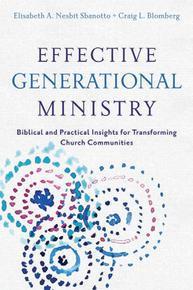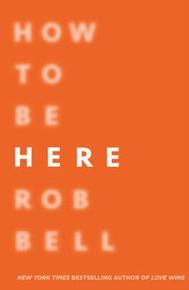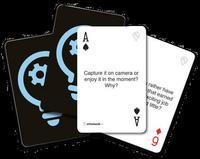Effective Generational Ministry
Elisabeth A. Nesbit Sbanotto and Craig L. Blomberg (Three and a half stars)

We can all agree that the world has changed at an incredibly fast pace over the last 50 years. The Western culture experienced by young people today is vastly different from that of their parents and grandparents, and we know that at times this makes for some interesting intergenerational relationships!
Effective Generational Ministry provides an in-depth look at the generational differences that have been identified over these last 50 years and, as the title suggests, presents biblical and practical insights for church ministry, taking into account the generational traits.
There are three generational cohorts presented here: ‘Boomers’ (born 1946–1964), ‘Generation X’ (1965–1980) and ‘Millennials’ (1981– 2001). For each cohort, there are three chapters: the first describes the common distinctive generational traits, the second assesses those characteristics from a biblical perspective and the third suggest how best to minister among and with that cohort.
It should be noted that this book is published by an academic publisher and is definitely more a study book than a ‘coffee shop read’. The sociological information about each cohort (based on American culture) is well researched and evidenced. The biblical teaching is presented alongside some thorough theological reflections and practical examples relating to each group.
I had to take a deep breath to dive into this book - the text is very small - at times my eyes skimmed through the pages until I reached the conclusion neatly presented at the end of each chapter. The description of each generational cohort was the most useful element, and on more than one occasion I found myself nodding in agreement. It is fascinating to understand how, as the authors say, ‘Each generation approaches life with its own collective personality’. With the youngest of the Millennials currently around 15 years old, there is much here to inform youth work today.
A key point that stood out to me was intergenerational relationships, especially in the form of mentoring. According to Sbanotto’s research, Millennials, are ‘hungry for intergenerational connections’ in a way that generations before them were not. This book values the contribution of each generation and encourages connectedness between people of all ages. This is an interesting, insightful read, but not for the faint-hearted!
Liz Ball works with Krunch South West as a youth mentor and a freelance writer.
Open
Vinyard UK (Three and a half stars)

Lovers of guitar-driven music may be disappointed to hear that Vineyard is shifting in a new direction but, to Vineyard UK, this is about spiritual growth.
Title track, ‘Open’, is filled with warm, heavenly vocals, combined with a strong, rhythmic beat and powerful melody, providing a middle ground from last year’s Waterfalls and leading us gently into the rest of Open: preparing the way for alternative worship.
As the album progresses, the music reflects faith being remixed and renewed for a new generation. Electro and dance fans will be delighted by the anthemic club sounds of ‘Living in the light’, featuring pulsating beats and meaningful lyrics, which are also found in the thought-provoking ‘All who are weary’ and the Owl City-esque ‘Concrete love’.
Open does lack the rawness of Waterfalls, but it allows Vineyard UK to explore faith in an inquisitive way. To truly appreciate Open you have to allow the album’s ethereal feeling of peace to grow on you and be willing to accept this new step in Vineyard UK’s journey. In the words of Vineyard songwriter Samuel Lane, be prepared for, ‘Something different, something unexpected; it’ll take you to a place you’ve not been to before’.
Kate Hill is a youth and community worker at Trinity Methodist Church, Nottinghamshire
How To Be Here
Rob Bell (Two stars)

And it featured an innovative writing style which had not
yet
grown
tiresome.
What made the book really remarkable was that while it was risky, it was still deeply rooted in scripture and the Christian faith. It was a book about knowing God; a book about the incredible Jesus who stands at the centre of time, the universe and everything, around whom it all revolves. It dug into the Bible and brought it to life in ways many of us had never seen and experienced before.
Rob’s journey ever since has been fascinating. He courted controversy with Love Wins, ‘was wished farewell’ by John Piper, and as a result, stepped down from pastoring and moved to California to work with his pals Carlton Cuse (most famous for co-writing Lost) and Oprah. Perhaps partly due to the influence of the latter, his books have veered further and further towards the self-help section of your local (or online) retailer.
So as we arrive at his latest book, we’re firmly in Oprah-style ‘soul food’ territory. How To Be Here purports to be ‘a guide to creating a life worth living’. The book uses a range of metaphors, from a Japanese word for purpose to the story of his own battles with the blank page, to encourage the reader to ‘stop steering their parked car’ and ‘find the craft in whatever you do’. God gets mentioned sporadically, but really these are Rob’s thoughts on how to live well, infused and informed by his Christian worldview. As such, it’s ok, but in what seems like a contravention of the sort of wisdom the author himself now peddles, it’s certainly not the book that only he could write.
Rob Bell was at his very best reinterpreting scripture to a generation that no longer knew it; the creative communication style was just there to help us digest the substance. Once the substance is removed, Rob’s infamous style becomes little more than a feature-length version of social media wallpaper. Quotes like ‘“You” hasn’t been attempted before’ would look really good superimposed on a picture of a cloud, but that’s about it.
In one of the rare mentions of Jesus, Rob confesses that he used to be a preacher; it’s a clear tell that he’s no longer writing for a Christian audience. In making the mainstream transition, he’s dramatically dialled down his substantial gift for biblical interpretation, and what we’re left with is Superman without his powers: just another self-help writer aiming to help you ‘Become A Better You’.
If all this sounds mean-spirited, it comes from a place of disappointment. I wish Rob was still the guy who wrote Velvet Elvis, but of course, the Church made that untenable. Instead, he’s made a new home in the mainstream, gently and admirably nudging people toward the fringes of faith. Like ‘The Frog Chorus’ then, How To Be Here is perfectly fine for what it is. But it’s no ‘Sgt. Pepper’s Lonely Hearts Club Band’; it’s not even ‘Live and Let Die’.
Martin Saunders is the deputy CEO of Youthscape.
Student Playing Cards
Schoolswork UK (Five stars)

I have previously used SchoolsworkUK’s discussion starter cards in small group lunch club contexts at secondary schools and they’ve been a real gem of a resource. Raising questions about life that go deeper than standard small talk is not an easy bridge to cross, especially if you don’t know the group too well. Having the medium of a game makes the whole thing less threatening; it means they can engage, get involved and take some control – they can ask leaders questions as well.
In these cards, aimed at older students than SchoolsworkUK’s previous set, there are four themes split between diamonds, hearts, spades and clubs (questions about you, about the world, about others and about beliefs), allowing you to either follow a particular theme or mix it up where you feel the need. Questions are nicely openended, leading to in-depth conversations which could go anywhere.
In my opinion, the new student cards are a welcome addition to the series, giving slightly more abstract questions for those asking serious questions about life, faith and identity. These are an excellent resource; now I just need to learn some card games!
Sam Buck is a youth pastor at Emmanuel Church, Northwood.






































